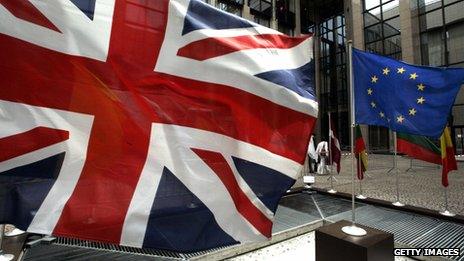UK begins great European Union debate
- Published

The UK is undertaking a broad consultation exercise on its EU membership
The first step has been taken in what is intended to be a far-reaching audit of Britain's relationship with the European Union.
Six reports have been published looking into, among other subjects, the single market and taxation and health services. A further 26 reports are to follow.
It is intended to be an enormous consultation exercise, which has never been undertaken by any other EU state.
So far only Italy and Bulgaria have made any submissions. Most have shied away, regarding this as a British domestic exercise.
Broadly the report found the balance of power between the member states and the EU appropriate.
These reports are a staging post on the way to the UK renegotiating the terms of its EU membership, which will eventually be put to the British people in an 'in-out' referendum. All of that depends on David Cameron winning the next election.
What these papers do not tell us is what powers the UK will want repatriated or what its strategy will be.
'Most challenging period'
Under the microscope in this initial stage was the single market. This has always been the area the UK has been most enthusiastic about.
So the report concludes that "integration has brought to the EU, and hence to the UK... appreciable economic benefits". It praises the market for spreading the UK's liberal model of policy making.
In the trade-off between cost and benefit the report says that most of those consulted answered positively and that was supported by the evidence.
It says the single market is "entering its most challenging period". It accepts that it would not be in the UK's interest to weaken the single market, but it raises the possibility of a 'red card' to give national parliaments a bigger role.
One report looks at the impact of EU membership on the UK's health services
In the area of taxation the report is clearer. The UK government opposes any extension of EU powers. Voting by unanimity over taxation should be retained, it argues. It asserts that taxation is primarily a matter for the member states. Taxation at a European level is only appropriate when there is clear market justification.
Over health services the report concludes that nursing has befitted enormously from the UK's membership of the EU, from the free movement of professionals. Yet the report also highlights the serious impact on the NHS caused by the Working Time Directive, which limits working time to 48 hours a week.
On foreign affairs the report raises the question of how to respond if the European Parliament sought a greater role in foreign affairs.
New relationship
These reports are evidence-based, well-balanced and reveal little about how the government will try to bring back powers from the EU.
What we do know is that the UK is trying to line up other countries that might back reform.
The Dutch government has concluded "ever closer union" has reached its limits. The Germans have hinted strongly they would support a return of some powers if that applied to all 28 EU members. But German MPs and ministers have more minor adjustments in mind rather than something more dramatic, which would involve changing EU treaties. The Italians, too, have spoken in favour of reform.
What is unlikely to change, however, is the EU's ambition of "ever closer union" written into the treaties. It runs in the DNA of Brussels officials that further integration is a good thing in itself.
It is hard to see how greater subsidiarity - when more powers are left to member states - could be guaranteed in practice.
The challenge for Mr Cameron will be whether he wins significant enough concessions to be able to present that as a renegotiation, which heralds a new relationship with Europe.
But the process of discussing, arguing, informing and debating has begun.